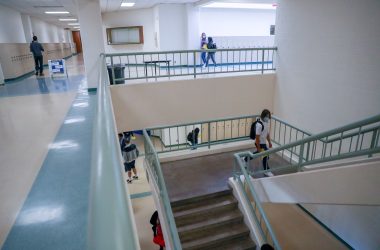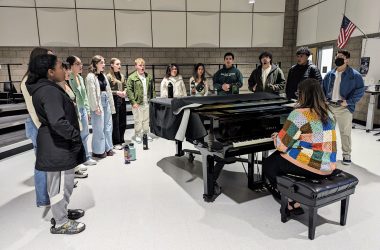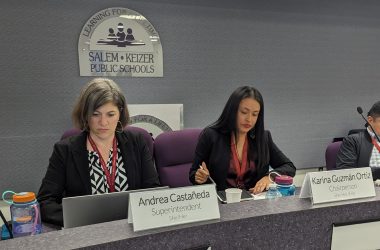Charlene Williams is about a month into the monumental job of leading a state education department in the wake of Covid.
She’s recently moved into the same office as her predecessor, Colt Gill, whose tenure as director of the Oregon Department of Education was defined by the public health threat of a lifetime and the challenge of getting 30,000 teachers and 500,000 students out of school buildings and onto computers for more than a year.
Williams’ tenure is likely to be defined by how she helps those teachers and students regain some of what they lost during that time.
In Oregon, students who were already deemed behind by measurements of credits, assessment tests and attendance before the pandemic, fell further, according to state data. More than 60% of first-time teachers who started in 2020 did not return to their posts the following year, exacerbating educator shortages in certain subjects and areas of the state.
As the newly appointed head of the state education department – the state Senate is expected to confirm her as director in September – Williams, 52, said she will unite the state’s 197 school districts around priorities that include growing and diversifying the teacher workforce, improving outcomes for students furthest behind and boosting literacy rates, attendance and student mental health.
Williams has already proven she can do that work, according to those who’ve worked with her in Portland Public Schools, where she spent the bulk of her education career before leading the state education agency.
Her career has been defined by serving students furthest behind, and who other adults and schools have given up on.
During her 17 years in Portland, Williams helped adults earn their high school equivalency diplomas, taught at and led an alternative high school and became principal of what was the city’s highest-need, lowest-performing high school, turning it around within four years.
Williams, who was born and raised in Wilmington, North Carolina, by her father and grandparents, said that her family valued school, but there wasn’t much pressure for her to attend college or choose any specific career. Her grandmother had a third-grade education, her grandfather left school after sixth grade, and she was inspired to see her dad earn a bachelor’s degree as an adult.
It wasn’t until Williams started talking with her high school math teachers about her future that she felt she was set on a career course that led her to the highest education office in Oregon, serving as its first Black director.
“I see as exceptional the work teachers do every day to inspire students like myself who may not even know all the options that are available, but who saw fit to inform me, to love me enough, equip me enough, and to pour into me the way they did,” she said. “So I’m just trying to pay that forward.”
GET THE MORNING HEADLINES DELIVERED TO YOUR INBOXSUBSCRIBE
Disrupting inequities
Williams’ high school math teachers challenged her to think about how her talents could be applied to disrupting inequities in the fields of science, technology, engineering and math. They got her thinking about college.
Just when she thought she’d made up her mind to become an engineer, she was thrust into teaching. During a math class senior year, a substitute who was supposed to teach calculus for the week did not in fact know any calculus. Williams taught the class instead, and loved it.
“After that week, it solidified for me that if I really wanted to disrupt inequities, it was really about time to go into education,” she said.
She earned undergraduate and masters degrees in math education at North Carolina State University and Wake Forest University, and spent her first four years out of college teaching high school math in Greensboro, North Carolina, in a struggling district with high teacher and administrator turnover. The principal she worked under became her model for leadership, she said.
He brought parents, community leaders, teachers and school staff together regularly to share ideas and strategies for improving the school, which eventually made great gains, Williams said. It taught her that leadership was not about making decisions in isolation.
“It’s important to have a range of perspectives that inform your decisions so that you can truly have the community and the school behind what you’re trying to do,” she said.
Then, in 1998, her husband got a job in Portland for what he and assured her would be a three-year journey before they’d go elsewhere, but they stayed put in the Northwest.
Turning Roosevelt around
After several years teaching adults at Portland Community College, Williams started in 2002 to teach math at Rosemary Anderson High School, a private alternative school in North Portland that’s a sort of “last chance high school” for students who’ve been expelled or dropped out of other schools.
The seven years she spent there were among the most formative of her career, she said. She learned that students are always listening and internalizing the labels given to them by adults.
Williams recalled giving a pep talk to students preparing to take a math assessment one day when a student of color interrupted her to say that everyone already expected her and her peers to fail.
“That was a moment where I decided for myself, like, no more of this,” Williams said. “We can’t have students believing that they are the problem.”
Jenni Villano, a retired educator and mentor to Williams, met her in 2006 when Williams was at Rosemary Adams. Alternative schools like Rosemary Adams often seem to be little more than “credit factories,” Villano said, where teachers give students credit just for showing up to class.
“Charlene was going to have none of that,” Villano said. “Charlene created an environment of true learning. She wanted her students to have true options and a future.”
Williams ascended to the school’s director of education while continuing to teach math in the mornings. In 2010, she took a job as principal for one of three small high schools that collectively made up the campus of Portland Public Schools’ Roosevelt High School.
The state had considered Roosevelt an underperforming school since the early 1980s. It had high turnover, and students scored well below state averages in reading and math. It served the highest proportion of high schoolers from low-income families in the district, and nearly 80% of students qualified for free or reduced lunch.
Roosevelt was also among the most diverse schools in the district. About one-third of students were Latino — the largest proportion of Latino students in the district — about one-quarter were African American and another third white.
As the three smaller schools within Roosevelt’s campus prepared to combine into a single high school, Williams helped apply for funding under an Obama-era program to help the lowest-performing schools in each state and brought in nearly $8 million. She was promoted to principal of the combined high school.
With the money, she was able to pay for new computers and technology, hired six nonacademic employees to help with college and career readiness and outreach to families and brought on a behavioral health coach. She also used some of the money to hire more teachers, so that high-performing teachers could spend part of the day coaching their peers one-on-one and in groups.
To boost enrollment and support from the neighborhood families, many of whom had sent their kids to other schools in Portland given Roosevelt’s reputation over the years, she held frequent community informational meetings and organized events to hear about families’ concerns.
People who most vehemently opposed or questioned Williams were invented to meet with her regularly in the school to talk, Villano said.
“When there’s pushback and your views and strategies are questioned, most people don’t handle that well,” Villano said. “In fact, Charlene brings that person onto her team so that they can see what’s really happening as opposed to making assumptions.”
When Williams took over as principal in 2010, there were about 700 students enrolled at Roosevelt, and just 39% graduated on time, according to data from the Oregon Department of Education. By the time Williams left in 2014, enrollment had grown by 30% to more than 900 students.
The on time graduation rate rose to nearly 64% for the class of 2012, but dropped to 53% in 2014, still nearly 15% higher than when Williams assumed the role of principal. The overall completion rate — anyone who earned a regular or alternative diploma or GED within five years of entering high school — was 77% by the time she left.
Alison Taylor, a teacher at Roosevelt High School, said Williams also worked hard to get buy-in from teachers at the school, who were used to administrators who would come in, shake things up and leave quickly.
“What happens is that teachers say, ‘You’re going to leave in two years so I just have to wait you out.’ But she didn’t. She was there. She stayed,” Taylor said.
Williams was promoted to the Portland Public Schools’ central office as senior director of school performance, where she continued to make improvements at Roosevelt and model similar changes across several other schools. During that time, she also earned a doctorate in education leadership from Lewis & Clark College in Portland.
After more than 14 years in Portland Public Schools, Williams left to become assistant superintendent of the Camas School District in Camas, Washington, and then deputy superintendent of Evergreen Public Schools in Vancouver, Washington, where Williams now lives.
Getting to work
Earlier this year, Williams was contacted by a head-hunting agency that Kotek’s office hired to find candidates for state education director. Williams said she was surprised to be among those contacted. The people who’ve worked with her are not.
Elisa Schorr, a former Roosevelt vice principal who worked under Williams, said students will benefit if Williams can do what she did in Portland for the state.
“If she can pull that off for all these different districts, that all kind of have their own thing going on, to be powerful for kids, I think we’ll be in a great place,” Schorr said.
Craig Hawkins, executive director at the Coalition of Oregon School Administrators, said Williams wasn’t on his radar until her name surfaced as a potential candidate for education director. He talked with people he knew in Washington who knew Williams from Vancouver and Camas and felt confident she’d be good for the job.
“Everything about those conversations leads me to believe that she’ll be committed to the success of each and every kid in Oregon,” he said.
After meeting with her, he’s impressed by her ability to ask good questions and to listen. He hopes she sticks around the education department for several years, as Gill did. The five years Gill was director was exceptionally long compared to his predecessors, none of whom stayed in the office for more than three years during the last decade.
“I’m really rooting for Dr. Williams to be there five years or more,” Hawkins said. “It just helps in terms of having the relationships, that trust that actually speeds things up and allows you to do more.”
It will also help as schools stare down years of turning around learning setbacks from Covid.
Williams, who earns about $250,000 a year, will continue on a statewide tour of districts this year to build relationships with school leaders, teachers, parents and kids and to talk about plans for the years ahead.
“The pandemic was a punch in the gut, and we are recovering and we’re learning how to take those deep breaths,” she said. “We have to get back up and lean into the urgency of our students, learning what they need to learn to be successful.”
Oregon Capital Chronicle is part of States Newsroom, a network of news bureaus supported by grants and a coalition of donors as a 501c(3) public charity. Oregon Capital Chronicle maintains editorial independence. Contact Editor Lynne Terry for questions: [email protected]. Follow Oregon Capital Chronicle on Facebook and Twitter.
STORY TIP OR IDEA? Send an email to Salem Reporter’s news team: [email protected].

Alex Baumhardt has been a national radio producer focusing on education for American Public Media since 2017. She has reported from the Arctic to the Antarctic for national and international media, and from Minnesota and Oregon for The Washington Post. She previously worked in Iceland and Qatar and was a Fulbright scholar in Spain where she earned a master's degree in digital media. She's been a kayaking guide in Alaska, farmed on four continents and worked the night shift at several bakeries to support her reporting along the way.









